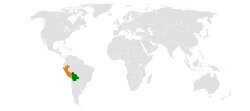Bolivia–Peru relations are the current and historical bilateral relations between Bolivia and Peru. Both nations are members of the Community of Latin American and Caribbean States, Group of 77, Organization of American States, Organization of Ibero-American States and the United Nations.
 | |
Bolivia |
Peru |
|---|---|
| Diplomatic mission | |
| Embassy of Bolivia, Lima | Embassy of Peru, La Paz |
History
editBoth Bolivia and Peru share a common history in the fact that both nations were once part of the Inca Empire and then as part of the Spanish Empire. During Spanish colonialism, Peru was governed by the Viceroyalty of Peru in Lima while the territory of Bolivia was split between the Viceroyalty of Peru and the Viceroyalty of the Río de la Plata in Buenos Aires. Soon after gaining independence from Spain, both nations joined to create the short-lived Peru–Bolivian Confederation. In 1839, both nations became independent nations. In 1879, both nations were allied against Chile during the War of the Pacific. At the end of the war, as a result, Bolivia lost all of its territory (Litoral Department) with access to the Pacific Ocean to Chile.
Relations between both nations have remained close and both nations work together in South American multilateral organizations. There have been numerous visits between leaders of both nations. In 1941, relations were elevated from legation to embassy level.[1] In 2010, Peruvian President Alan García agreed to allow Bolivia to build a port south of Peru's port of Ilo.[2]
On December 26, 2023, Peruvian politician Vladimir Cerrón, a fugitive for the past two months, reportedly sought political asylum at both the Bolivian embassy and its residence, located a few minutes away, with members of the National Police of Peru immediately positioning themselves outside of said embassy (as well as those of Cuba and Venezuela) to prevent such an event from taking place. Cerrón denied the allegations, claiming that him leaving the country was in the interests of the country's elite.[3]
Resident diplomatic missions
edit- Bolivia has an embassy in Lima and consulates in Cusco, Ilo, Puno and Tacna.
- Peru has an embassy in La Paz and consulates-general in Cochabamba and Santa Cruz de la Sierra.
-
Embassy of Bolivia in Lima
-
Embassy of Peru in La Paz
See also
editReferences
edit- ^ Solf y Muro, Alfredo (1941). "Primer Embajador de Bolivia". Memoria que el Ministro de Relaciones Exteriores (in Spanish). Ministerio de Relaciones Exteriores. pp. 98–99.
- ^ Caroll, Rory (20 October 2010). "Peru gives landlocked Bolivia a piece of Pacific coast to call its own". The Guardian. Retrieved 16 May 2012.
- ^ Villarroel Zurita, Alexander (2023-12-26). "Vladimir Cerrón buscó llegar a residencia del embajador de Bolivia para asilarse". El Comercio.
External links
edit- Archives for Peru-Bolivia relations Peruvian Times